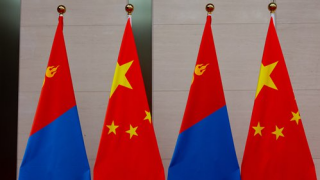Xin Ge

A view of the Boao Forum for Asia (BFA) International Conference Center in Bo'ao, south China's Hainan Province, March 17, 2024. /Xinhua
Editor's note: Xin Ge, a special commentator on current affairs for CGTN, is a research fellow at the Institute of Public Policy and Governance, Shanghai University of Finance and Economics (SUFE), and associate professor at the School of Public Economics and Administration, SUFE. The article reflects the author's opinions and not necessarily the views of CGTN.
On April 21, 2022, Chinese President Xi Jinping unveiled the Global Security Initiative (GSI) during his keynote address at the Boao Forum for Asia (BFA) Annual Conference. Since then, guided by the initiative's core principles, China has been actively advocating for the political resolution of international and regional hotspot issues. This dedication has yielded tangible progress, underscoring China's commitment to safeguarding global peace and stability.
In today's geopolitical landscape, persistent global security concerns are marked by frequent outbreaks of regional conflicts and turmoil. The introduction of the GSI represents China's contribution to addressing the global peace deficit, offering a distinctively Chinese approach to resolving complex security challenges.
Rooted in the concept of a global community with a shared future, the GSI emphasizes six key principles. These include fostering a sense of common, comprehensive, and cooperative security, as well as upholding the principles of sovereignty and territorial integrity for all nations.
Furthermore, the initiative underscores the paramount importance of adhering to the UN Charter's principles and ensuring that legitimate security concerns of all nations are respected. It advocates for peaceful dialogue and consultation as the primary means to resolve inter-state disputes, while also stressing the need to coordinate security efforts across both traditional and non-traditional domains.
Standing at the forefront of the GSI, China has been actively championing its principles and fostering international cooperation. Grounded in principles of mutual respect, openness and inclusiveness, multilateralism, win-win cooperation and balancing interests, China has proactively engaged in bilateral and multilateral security dialogues with nations worldwide and international organizations.
Notably, the initiative has garnered support from over 100 countries and international and regional organizations. The inclusion of GSI in various bilateral and multilateral agreements underscores its growing importance in shaping China's global engagements and cooperative endeavors.
In late February 2023, China released two significant documents: The Global Security Initiative Concept Paper and China's Position on the Political Settlement of the Ukraine Crisis, offering systematic insights and actionable measures to address current and future global security challenges.
Later in March 2023, Saudi Arabia and Iran restored diplomatic ties after China's mediation, igniting a "wave of reconciliation" across the Middle East. This exemplifies how the GSI can serve as a catalyst for resolving regional conflicts. In April 2023, China released its position paper on the Afghanistan issue, demonstrating its commitment to fostering regional prosperity and stability through constructive engagement.
Furthermore, in response to mounting global threats, China is actively collaborating with other nations through counterterrorism, biotechnology, cybersecurity, food security, and climate change. Proposals like the "Global Initiative on Data Security" and the "Global Artificial Intelligence (AI) Governance Initiative" underscore China's proactive approach to tackling emerging challenges.
Additionally, China's deployment of over 50,000 UN peacekeeping personnel and its provision of medical aid to over 290 million patients through international medical missions highlight its significant contributions to global peace and humanitarian efforts.

Chinese peacekeepers march at a medal parade ceremony in Hanniyah village, southern Lebanon, July 1, 2022. /Xinhua
Looking ahead, China's leadership in regional security cooperation under the GSI can be advanced by at least three key strategies in my point of view.
First, China must deepen international consensus on shared security objectives and cultivate tangible collaboration in the domain of global security. This necessitates bolstering dialogue on security policies through high-level exchanges, diplomatic consultations, and interdepartmental communication.
Leveraging platforms like the BFA, the Beijing Xiangshan Forum, the Munich Security Conference, and the Shangri-La Dialogue, China can facilitate comprehensive discussions on the principles and practices of the GSI. Moreover, China should take concrete steps with all stakeholders across the initiative's key areas of cooperation, continuously broadening the scope and efficacy of collaboration.
China could uphold the resolution of hot-spot issues through political means. The Chinese approach to addressing such issues emphasizes non-interference in internal affairs, political solutions, objectivity, impartiality, and holistic remedies. We believe that in global conundrums such as the Ukraine crisis, the Israel-Palestine issue, and the situation in the Red Sea, China's constructive engagement is essential for defusing tensions.
In addition, China should continue to vigorously champion improvements to the global security governance system. China has consistently called for unwavering support for the UN's central role in global security governance.
Major powers bear special responsibilities in upholding international peace and security and should lead in advocating and engaging in cooperation efforts. China stands ready to shoulder primary responsibility for security governance alongside governments and intergovernmental organizations worldwide. Simultaneously, it actively encourages involvement from civil society to establish a cohesive approach to security governance.
Especially in emerging security realms like cybersecurity, AI security, biosecurity, and space security, China ought to take the lead in practical exploration to develop adaptable and effective governance models.









